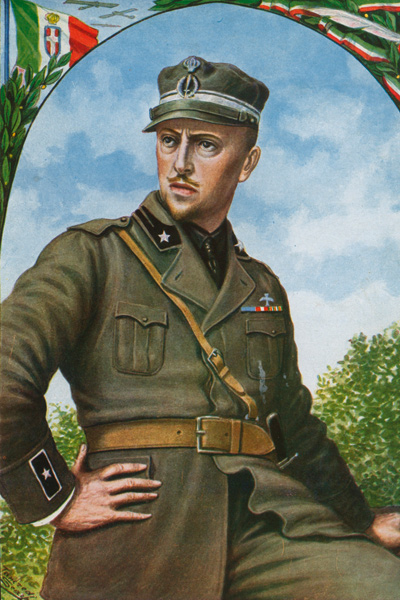There is something to be said for a bald-headed gnome with the power, according to his biographer, to seduce any woman he wanted, including the most celebrated and desirable actress of the day, despite being handicapped by red-rimmed eyes, bad breath and crooked teeth ‘of three colours, white, yellow and black’. And something more deserves to be said about the seducer’s rabble-rousing demagoguery that allowed him to pave the way for fascism, and for the nationalist hatred of democracy that blighted Europe after the first world war. But whether those deserts really require 200,000 words is another matter.
The gnome was Gabriele d’Annunzio, who stumbled into the footnotes of history when he seized the Yugoslav city of Rijeka, or Fiume, in 1919 on behalf of Italy. He was by then the most famous literary figure in the country — ‘the greatest Italian poet since Dante’, Lucy Hughes-Hallett suggests, as well as a dramatist whose incendiary play provoked a riot, and a novelist admired by James Joyce.
He was also an inveterate note-taker, absorbed by the detail of his own life which he recorded in lengthy, self-congratulatory style. For a biographer, such personal material is dusted with gold, but is liable to lure the best of writers into its maze of self-justifying significance.
To tackle her flamboyantly narcissistic subject, Hughes-Hallett decided to abandon chronology in favour of a mosaic of information presented in foxtrot tempo so that the slow development of characters or conversations alternates with the quick collapse of whole years into a few paragraphs.
For almost 300 pages, this idiosyncratic structure works astonishingly well. The high spots of D’Annunzio’s fascinating yet repellent career appear in a kaleidoscope that places his birth in the Abruzzi capital of Pescara long after the first steps of his rapid climb to fame as journalist and poet in the 1880s, and the flying accident that blinded him in one eye during the first world war comes before his famous affair in the 1890s with the actress, Eleanora Duse — the Elizabeth Taylor of her time — that established D’Annunzio as Italy’s top celebrity stud.
His spendthrift ways, his eagerness for speed in planes and cars, his seductive technique of filling rooms with roses, his taste for neo-classical statuary and over-furnished rooms are all touched upon, and the notebooks provide copious reference to his sexual preferences. Of his first meeting with the actress Ida Rubinstein at an opening night party he wrote:
Seeing at close quarters those marvellous naked legs, with my usual boldness I threw myself to the ground and — quite oblivious of my swallow-tail coat — kissed the feet, rose, still kissing, from the ankle to the knee and up along the thigh to the crotch, kissing with lips as swift and supple as a flautist’s scurrying over the stops of a double flute.
The swallow-tailed coat is a brilliant detail, but the exploit still sounds more uncomfortable than credible.
D’Annunzio owed his celebrity status in these early years to his writing, and the dearth of direct quotation, especially from his poetry, is a drawback. Not even the opening lines of his endlessly anthologised ‘La pioggia nel pineto’ (‘Rain in the pinewood’) are offered, although the onomatapoeic description — rain on pines, scaley and bristly, rain on myrtles divine — and the springy rhythm and easy rhyming go a long way to explain his poetry’s extraordinary popularity:
Piove su i pini
Scagliosi ed irti,
Piove su i mirti
Divini.
Nevertheless, the first half of The Pike — a nickname bestowed on the young D’Annunzio by friends in tribute to his cold, voracious ambition — is hugely enjoyable, not least because the biographical style matches the subject’s solipsistic assumption that history was what happened to him.
The book’s major weakness lies in the failure of nerve that mars its second half. With the outbreak of war in 1914, thekaleidoscopic structure succumbs to the chronology of outside events. Presumably the change was made because this is the period when D’Annunzio’s literary fame became political, and his ecstatic worship of sensation evolved into the advocacy of violence. But it means that episodes already described, such as his flying exploits during the war and the taking of Fiume in 1919, now return with a wealth of notebook-derived detail that is wearying rather than illuminating. And, once set against the unbearable waste of war, and the terrible blood-letting at Caporetto in 1917 that precipitated Italy’s postwar constitutional crisis, D’Annunzio’s vicious ideals and vacuous morality are stripped of all disguise. They do not make for easy reading.
Despite these flaws, The Pike stands out for its imaginative exploration of a poet who, although barely read today, still serves as a template for the politics of bombast and bunga-bunga.






Comments